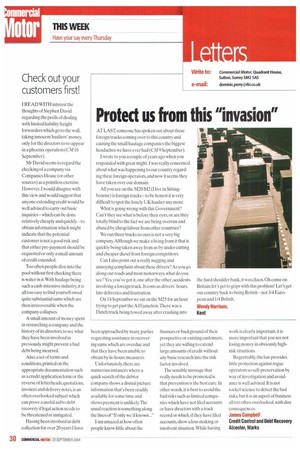Check out your customers first!
Page 30

If you've noticed an error in this article please click here to report it so we can fix it.
I READ WITH interest the thoughts of Stephen David regarding the perils of dealing with limited liability freight forwarders which go to the wall, taking innocent hauliers' money. only for the directors to re-appear in a phoenix operation (CM 16 September).
Mr David seems to regard the checking of a company via Companies House (or other sources) as a pointless exercise. However. I would disagree with this view and would suggest that anyone extending credit would be well advised to carry out basic inquiries— which can be done relatively cheaply and quickly — to obtain information which might indicate that the potential customer is not a good risk and that either pre-payment should be requested or only a small amount of credit extended.
Too often people dive into the pool without first checking there is water in it.With haulage being such a cash-intensive industry, it is all too easy to find yourself owed quite substantial sums which are then irrecoverable when the company collapses.
A small amount of money spent in researching a company and the history of its directors, to see what they have been involved in previously,might prevent a bad debt being incurred.
Also, a set of terms and conditions, printed on the appropriate documentation such as a credit application form or the reverse of letterheads, quotations, invoices and delivery notes, is an often overlooked subject which can prove a useful aid to debt recovery if legal action needs to be threatened or instigated.
Having been involved in debt collection for over 20 years I have been approached by many parties requesting assistance in recovering sums which are overdue and that they have been unable to obtain by in-house measures.
Unfortunately, there are numerous instances where a quick search of the debtor company shows a dismal picture: information that's been readily available for some time and shows payment is unlikely. The usual reaction is something along the lines of"if only we'd known..."
I am amazed at how often people know little about the finances or background of their prospective or existing customers, yet they are willing to extend large amounts of credit without any basic research into the risk factor involved.
The sensible message that really needs to be promoted is that prevention is the best cure. In other words, it is best to avoid the bad risks such as limited companies which have not filed accounts or have directors with a track record or which. if they have filed accounts, show a loss-making or insolvent situation. While having work is clearly important, it is more important that you are not losing money in obviously highrisk situations.
Regrettably, the law provides little protection against rogue operators so self-preservation by way of investigation and avoidance is well advised. It is not rocket science to detect the bad risks, but it is an aspect of business all too often overlooked, with dire consequences.
James Campbell Credit Control and Debt Recovery Alcester, Warics




























































































































































































